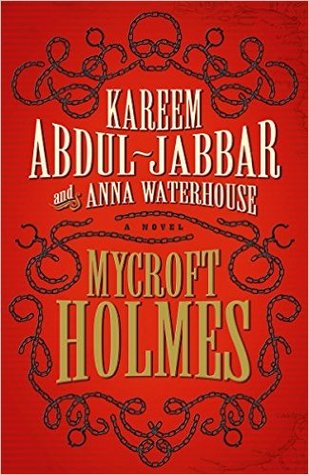The latest novel to embrace this genre, Mycroft Holmes, by Kareem Abdul-Jabbar and Anna Waterhouse is a pleasant surprise. What first caught my attention is the book’s co-author, Kareem Abdul-Jabbar, a person best known as the all-time leading scorer in the NBA. Since his basketball retirement in 1989, Abdul-Jabbar has co-authored a number of books with African-American history themes, but this is his first venture into fiction. Mycroft Holmes, a minor and somewhat mysterious figure in the original stories, comes to life in this novel, demonstrating a similar intellectual rigor and similar egotism as typically displayed by his brother. Set in the early 1870s, this novel finds Sherlock at college and still refining his powers of deduction under the tutelage of his elder brother Mycroft, a civil servant in the British government.
What Mycroft Holmes does very well is weave in a history of African Diaspora, slavery and racial oppression without overwhelming the underlying mystery. The story is set in motion by a number of strange deaths in Trinidad attributed to the douen and lougarou, evil spirits that might remind the reader of the hound of Baskerville. Mycroft is drawn into this mystery by the concerns of his fiancé, Georgiana, whose family are white plantation owners on the Island, as well as his friend Cyrus Douglas, a businessman of African descent, born in Trinidad. There is richness to Douglas’ character, as a person who has to continually negotiate a difficult racial path in Victorian England. On the other hand, the most disappointing aspect of the story is the lack of well-developed female characters. Even Georgiana, the central femme fatale, is such a flat half-character that I scarcely cared about her. It would have enriched the story a great deal if the reader could be more invested in her role. While the story is engagingly well-written, with elements that will remind the reader of Doyle’s work, it never reaches the depth or complexity of the original. The mystery that motivates Douglas and Holmes to take a difficult journey to Trinidad becomes secondary and its solution is almost inconsequential. There is instead an action sequence toward the end of the book that will remind the reader more of the Downey movies than the deductive reasoning with which my image of Sherlock Holmes uses to bring his cases to a close.
How about you--who is you favorite Holmes? What are your favorite adaptations in books and shows?
--Reviewed by Kevin S.--

Thanks Kevin, this was really interesting. I remember Kareem Abdul-Jabbar's books about African American inventors and Black Profiles in Courage, but did not know about the Sherlock Holmes book - sounds like a mystery with an interesting historic twist. PP
ReplyDelete